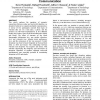Free Online Productivity Tools
i2Speak
i2Symbol
i2OCR
iTex2Img
iWeb2Print
iWeb2Shot
i2Type
iPdf2Split
iPdf2Merge
i2Bopomofo
i2Arabic
i2Style
i2Image
i2PDF
iLatex2Rtf
Sci2ools
CSCW
2010
ACM
2010
ACM
Warrants and deception in computer mediated communication
This article explores the operation of warrants, connections between online and real-world identities, on deceptive behavior in computer-mediated communication. A survey of 132 participants assessed three types of warrants (the use of a real name, a photo, and the presence of real-world acquaintances) in five different media: IM, Forums, Chat, Social Networking Sites (SNS) and Email. The effect of warrants on lies about demographic information (e.g., age, gender, education, etc.), one’s interests (e.g., religion, music preferences, etc.), and the seriousness of lies was assessed. Overall, deception was observed most frequently in Chat and least often in SNS and Email. The relationship between warrants and deception was negative and linear, with warrants suppressing the frequency and seriousness of deception regardless of medium, although real-world acquaintances were especially powerful in constraining deception in SNS and emails. Author Keywords Deception, anonymity, CMC, warrants,...
ACM Classification Keywords | Author Keywords Deception | CSCW 2010 | Real-world Acquaintances | Social Sciences |
| Added | 17 Mar 2010 |
| Updated | 17 Mar 2010 |
| Type | Conference |
| Year | 2010 |
| Where | CSCW |
| Authors | Darcy Warkentin, Michael Woodworth, Jeffrey T. Hancock, Nicole Cormier |
Comments (0)

